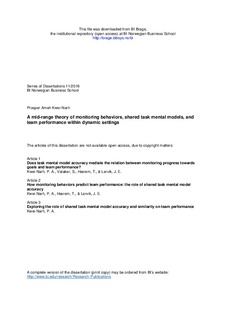A mid-range theory of monitoring behaviors, shared task mental models, and team performance within dynamic settings
Abstract
This dissertation is an enterprise in building a mid-range theory of teamwork within emergency settings wherein I attempt to explain some contrasting findings in the literature. I focus on a limited number of variables in order to provide a more detailed account that will enrich our understanding of teamwork within these dynamic settings. Specifically, I examined how monitoring behaviors predicts team performance through its effect on shared task mental model accuracy. Whereas there is a general theoretical agreement that monitoring behaviors should predict team performance, the empirical record paints a picture where monitoring behaviors has both a positive and a negative effect on team performance.
The dissertation is based on three studies:
1. Does task mental model accuracy mediate the relation between monitoring progress towards goals and team performance?
The first study focused only on the progress monitoring aspect of monitoring behaviors, where, similar to some previous studies, progress monitoring did not exhibit a significant direct positive effect on team performance.
2. How monitoring behaviors predict team performance: the role of shared task mental model accuracy.
The second study tested two mediation models; one focused on a cross level mediation relation where individual monitoring behaviors improved shared task mental model accuracy and thus predicting team performance. The other model tested was that in which individual monitoring behaviors enhances the individual task mental model and thus predicting the performance scores, whiles simultaneously testing the relation among the variables at the team level.
3. Exploring the role of shared task mental model accuracy and similarity on team performance.
The third study considers the role of shared task mental models accuracy and similarity in predicting team performance.
